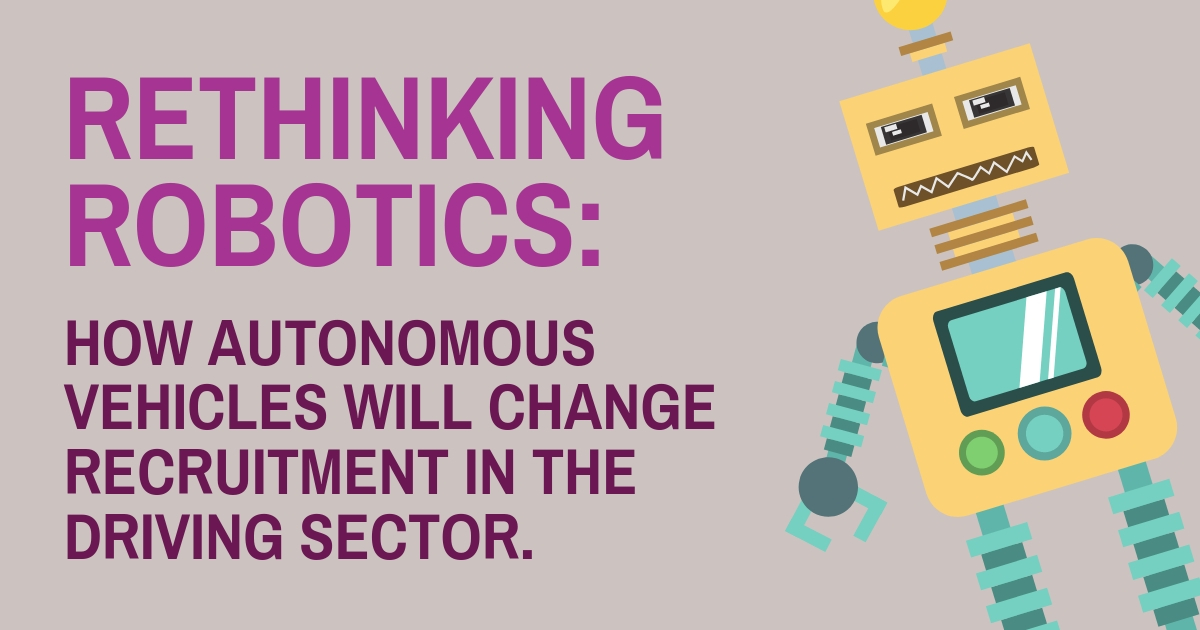How autonomous vehicles will change recruitment in the driving sector.
Self-driving cars were once the thing of science fiction, along with spaceships, hover crafts and teleportation devices. However, in 2019 driverless cars are becoming a reality. In fact, autonomous car technology has been under development by the likes of Lexus, BMW and Mercedes for many years and Google’s self-driving car project Waymo has already placed around 600 driverless cars on public roads in Pheonix, Arizona.
And it’s not just hatchbacks and SUV’s getting the star treatment, truck manufacturers have also been quietly working on similar technology. In fact, in as early as 2015, a driverless LGV developed by Daimler was tested on public roads in Germany for the very first time.
In the UK, ministers recently announced plans to move forward on advanced trials for automated vehicles. In a statement by the Department for Transport, it was stated that the UK is 'on track to meet its commitment to have fully self-driving vehicles on UK roads by 2021.' As part of this commitment, we are expecting to see driverless cars on UK roads, for testing purposes, by the end of 2019.
Although it is not yet clear whether this commitment will be met, one thing for sure is that when driverless vehicles do come to the UK, they will influence the UK economy. Employment is, of course, a key area that could be affected.
So how will technology affect employment?
In a recent study by the University of Oxford, entitled The Future of Employment, it was reported that 35% of UK jobs were at ‘high risk’ of automation over the next 20 years, with the most at risk including computer-based roles such as office and administrative support.
Having said this, PwC have predicted that artificial intelligence (AI) would create as many jobs, in the UK, as it displaced – forecasting that by 2037, 7 million jobs will be lost, while 7.2 million jobs will have been created.
Of the 7 million jobs that will be lost, it is thought that the manufacturing and transportation sectors will be the hardest hit, which of course employ many drivers as well as office and industrial workers. So are we witnessing the end of driving roles?
With headlines such as ‘Nearly 1.2 million driving jobs at risk from driverless cars’ and ‘Robot cars will kill London jobs’ it is easy to see why there is fear among drivers and employers alike. However, what a lot of this narrative misses is that, in many cases, drivers (despite their job titles) do more than just drive.
We asked Amanda Holmes, Assistant Operations Manager at Berry Recruitment Hendon for comment. Amanda, who is one of Berry’s leading driving recruitment specialists, said ‘The role of drivers, such as HGV or 3.5 Tonne, includes a range of factors such as customer service, problem solving and manual handling.’
‘So, even if the transportation aspect of their role was fully automated, a ‘driver’ would still need to be present to fulfil other aspects of the role including unloading the goods, providing customer assistance and ensuring health and safety.’
In addition to this, the evolution from traditional vehicles to automated and driverless ones has created a multitude of jobs relating to vehicle manufacture, software engineering and data science, and as technology continues to progress and driverless cars become common place, we can only expect to see a growth in these types of roles. In fact, postings for jobs within the autonomous driving field had increased 27 percent by January 2018, according to ZipRecruiter, in comparison to the previous year.
And the new jobs autonomous vehicles are creating don’t just stop with the vehicles themselves. There is an entire employment ecosystem being built around them, resulting in a broader scope of jobs, including fleet management, customer service, remote operations, vehicle maintenance and health and safety, as well as additional roles in insurance and sales.
Our verdict
Although autonomous cars are certainly set to shake things up, the future still looks bright for employment in the driving sector. The types of roles and responsibilities that professional drivers undertake will inevitably have to change and adapt, but this type of adaptation is not dissimilar to the changes other professions have witnessed all throughout history.
Change is likely to be gradual and more immediate problems include the quality of the UK road network, the lack of young workers in the sector and potential EU restrictions. New technology may, in fact help some of these problems by attracting new workers to the sector. Plus we should remember that driving demand will continue to be influenced by traditional forces such as the strength of the economy and consumer spending.
In every industry in the world, from healthcare to marketing, driving to retail, technology is evolving the way we work. Yet there will always be certain skills that computers, robots and AI will struggle to learn including critical thinking, abstract problem solving, creativity and empathy.
Humans have intuitive abilities, the ability to learn from previous experiences and alter our responses to changing environments. Humans can work passionately while also creating strong business cultures through teamwork and collaboration.
Will robots ever be able to replace humans? Only time will tell.


